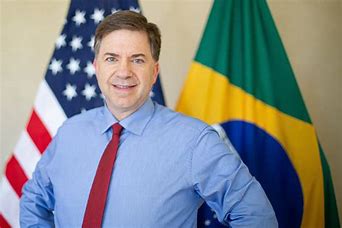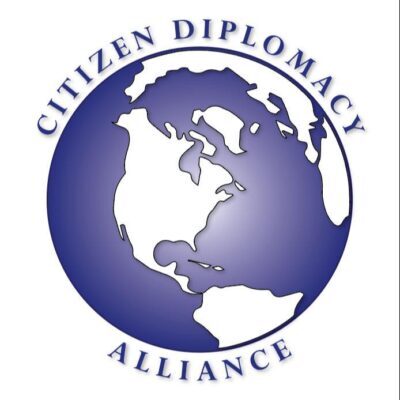
World Watch Brazil June 8, 2021
In a relaxed and very personable manner, Ambassador Chapman began by referencing his close personal ties with Arizona and acknowledging our Pat Watson for her persistence in putting him on our Ambassador World Watch schedule. He also praised her work with Citizen Diplomacy Alliance with the statement: “Citizen Diplomacy happens not through governments, but through people ‘one handshake at a time.’ I firmly believe that is the way to cement friendships throughout the world.†He then went on to talk about a special relationship between Brazil and Arizona via trade, sports, and the arts, mentioning several prominent local Brazilians by name.
As he turned to his time in Brazil and his love of the country that began when he was a child and his family was transferred to Sao Paulo, he also began to talk about some of the challenges he has encountered since taking over as Ambassador in 2020. The first “dominant challenge†was the COVID crisis as Brazil’s death toll is second only to the U.S. He clarified, however, that Brazil’s population is far larger than many of the other countries, and per capita, the death toll is lower than many of the most stricken countries.
Brazil has an extremely strong health care partnership with the United States and is home to the CDC’s regional headquarters for all Latin America. In addition, the diversity races found in Brazil from world-wide immigration has made the Brazil a microcosm of the world’s populations, and an ideal place for “pharma†to develop, test and monitor drugs, vaccines, and other health-related protocols.
When asked about Brazil’s relationship with Venezuela, Ambassador Chapman stated that Brazil is very much aligned with the United States in helping to plant the seeds for democratic change and has recognized the authority of Guaidó over Maduro. In addition, Brazil has opened its doors to over 500,000 refugees from Venezuela and Ecuador.
In terms of the environment, he recognized deforestation as an issue, but also said that Brazil sees the major and most immediate environmental problem as the pollution of the Amazon because of lack of sanitation in remote areas. He also mentioned that in terms of clean energy, Brazil has taken a lead in hydro and wind power, but drought and other climate related concerns have slowed down the progress.
As other Ambassadors have mentioned, China’s powerful buying power has made them a primary trade partner, which affords them political and economic “clout†and a challenge to the U.S. agenda.
In support of CDA partner, Pima Community College’s International Program, there was a question about educational partnerships between the U.S. and Brazil. Ambassador Chapman indicated that there are already very strong partnerships with a variety of U.S. educational consortiums, including the University of Arizona and Arizona State University. He strongly urged Pima to join one of these groups to have a stronger voice and increase opportunities to work with Brazil and other countries.
On June 11, 2021 just one week after this talk, Ambassador Chapman announced his retirement from the diplomatic service to pursue other opportunities.
Submitted by Patricia Houston, VP Citizen Diplomacy Alliance.
